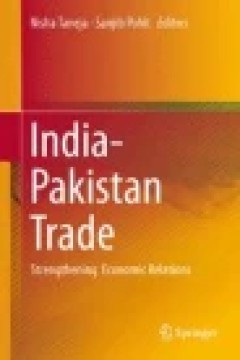Filter by

A Guide to the UNCITRAL Arbitration Rules
The first version of the UNCITRAL Arbitration Rules was endorsed by the General Assembly of the United Nations in December 1976. Now considered one of UNCITRAL's greatest successes, the rules have had an extraordinary impact on international arbitration as both instruments in their own right and as guides for others. The Iran-US Claims Tribunal, for example, employs a barely modified version of…
- Edition
- -
- ISBN/ISSN
- 9781139018135
- Collation
- -
- Series Title
- -
- Call Number
- -

India-Pakistan Trade: Strengthening Economic Relations
Examining the implications of recent important developments, the primary aim of this book is to bridge the gaps in existing literature on India-Pakistan economic engagement and to examine various aspects of the trade normalization process. The book includes familiar themes of India-Pakistan bilateral trade in goods and services, providing new insights into the potential for trade and the cha…
- Edition
- 1
- ISBN/ISSN
- 978-81-322-1948-4
- Collation
- XX, 347
- Series Title
- -
- Call Number
- 330 IND

Arguing With Anthropology
Arguing with Anthropology is a fresh and wholly original guide to key elements in anthropology, which teaches the ability to think, write and argue critically. Using the classic 'question of the gift' as a master-issue for discussion, and drawing on a rich variety of Pacific and global ethnography, it provides a unique course in methods, aims, knowledge, and understanding. The book's highly ori…
- Edition
- -
- ISBN/ISSN
- 9781134523450
- Collation
- -
- Series Title
- -
- Call Number
- -

Variance in Approach Toward a ‘Sustainable’ Coffee Industry in Costa Rica…
"The monograph considers influence over time of Fairtrade and Rainforest Alliance in 10 Costa Rican coffee farming communities. In-country perspectives and relevant historic and contemporary literature inform findings. Misaligned intentions to outcomes; different sustainability approaches; and variable influence is observed. There is opportunity to: consider when certifications are most useful;…
- Edition
- -
- ISBN/ISSN
- 9781911529798
- Collation
- -
- Series Title
- -
- Call Number
- -

Treatises on Solvency II
The European system of insurance supervision under Solvency II constitutes a parallel to supervision of credit institutions under Basel III. At the heart of this new European insurance supervisory regime are the Solvency II Directive, the attendant regulation, and the EIOPA Regulation. The present volume, "Treatises on Solvency II", includes articles on the bases of European insurance supervisi…
- Edition
- -
- ISBN/ISSN
- 978-3-662-46290-4
- Collation
- -
- Series Title
- -
- Call Number
- -

Transforming Payment Systems in Europe
The European payment market has undergone rapid transformation in recent years due to changes in payment habits, new business rules and new legal frameworks and regulation. There has also been an advent of new technologies and payment solutions which has altered the European payments landscape drastically. This book provides an overview of the fundamental issues involved in this new payments…
- Edition
- -
- ISBN/ISSN
- 978-1-137-54121-5
- Collation
- -
- Series Title
- -
- Call Number
- -

Encounters and Practices of Petty Trade in Northern Europe, 1820–1960 Forg…
This open access book uncovers one important, yet forgotten, form of itinerant livelihoods, namely petty trade, more specifically how it was practiced in Northern Europe during the period 1820–1960. It investigates how traders and customers interacted in different spaces and approaches ambulatory trade as an arena of encounters by looking at everyday social practices. Petty traders often belo…
- Edition
- -
- ISBN/ISSN
- 9783030980801
- Collation
- -
- Series Title
- -
- Call Number
- -

Trade Policy between Law, Diplomacy and Scholarship Liber amicorum in memori…
This book presents 22 topical contributions on international trade law and policy, with a particular focus on EU external trade law, addressing countries ranging from Ukraine to Switzerland and the US (TTIP) and aspects from trade and IPRs to anti-dumping. The volume constitutes a state-of-the-art treatment of the many facets of trade policy in the 21st century from legal, diplomatic and academ…
- Edition
- -
- ISBN/ISSN
- 978-3-319-15690-3
- Collation
- -
- Series Title
- -
- Call Number
- -

The Shipping Industry, Ocean Governance and Environmental Law in the Paradigm…
This book examines the corpus of status quo environmental legal regime, geographical issues and redundant “stakeholder claims,” which persist in the Arctic. It examines multifarious theories relating not only to conflicting and opposing interests, but also to parties to whom the shipping industry should be accountable. The unique aspect of this book is the Corporate Social responsibility an…
- Edition
- -
- ISBN/ISSN
- 978-3-319-12541-1
- Collation
- -
- Series Title
- -
- Call Number
- -

Nordic-Iberian Cod Value Chains:Explaining salted fish trade patterns
This book is a multidisciplinary analysis of cultural, regional and economic factors affecting international food trade. Contributions from expert authors illuminate the importance of food culture prevailing in the market as a basis for decisions about food trading. Central concepts include value chains, conventions and public infrastructure and their importance for international trade. The …
- Edition
- 1
- ISBN/ISSN
- 978-3-319-16404-5
- Collation
- X, 223
- Series Title
- MARE Publication Series
- Call Number
- -
 Computer Science, Information & General Works
Computer Science, Information & General Works  Philosophy & Psychology
Philosophy & Psychology  Religion
Religion  Social Sciences
Social Sciences  Language
Language  Pure Science
Pure Science  Applied Sciences
Applied Sciences  Art & Recreation
Art & Recreation  Literature
Literature  History & Geography
History & Geography